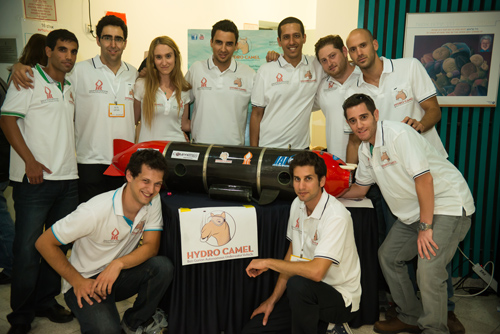
A team of 18 BGU students has designed and developed an intelligent, autonomous submarine called the “Hydro Camel,” the first of its kind in Israel. Several members of the BGU Hydro Camel submarine team are currently competing in the 16th Annual RoboSub Competition taking place in San Diego from July 22-28, sponsored by the United States Office of Naval Research and the AUVSI Foundation (Association for Unmanned Vehicle Systems International).
This year’s competition features 36 national and international collegiate and high school teams. The goal is to advance the autonomous underwater vehicle (AUVs) development by challenging a new generation of engineers to perform realistic missions in an underwater environment.
“There is a need for an autonomous submarine that is equipped with an intelligent navigation system with functions that include mission planning, obstacle avoidance and decision-making that are as good as a human operator,” said Prof. Hugo Guterman, head of BGU’s Laboratory of Autonomous Robotics.
“After the competition, we plan to further develop the submarine to its optimum capabilities, which we hope will place the State of Israel at the forefront in developing tools for marine autonomy,” noted Hydro Camel team member Guy Kagan, who will be competing in San Diego.
The cylindrical, carbon fiber Hydro Camel sub measures some five feet (1.5 m), weighs 84 lbs. (38 kg.) and is divided into five main cells. The four side cells, filled with water, contain six thrusters, a robotic arm, torpedoes, batteries, and cameras. The central cell houses the electrical system, main computer and all electrical components. Today, there are many remotely operated submarines that handle important tasks such as checking underwater pipelines, mapping underwater minefields and searching for sunken vessels. However, they are limited by effective communication cables and require frequent human-operator contact.
“BGU is developing a more accurate and effective autonomous, independently thinking underwater vessel that would revolutionize their ability to carry out other tasks,” explained Boris Braginsky, another BGU team member competing in San Diego.
“BGU is quickly becoming known in the United States and worldwide for its robotics expertise, having recently led Israel’s team in the Defense Advanced Research Projects Agency (DARPA) Robotics Competition,” said Doron Krakow, executive vice president, American Associates, Ben-Gurion University of the Negev (AABGU). “We wish the team members much luck and appreciate their contribution to the research and technological advancement of the State of Israel. I also want to thank our generous supporters for making the team’s participation possible.”
The students are able to attend the competition due to support from AABGU donors Murray and Robert Shusterman from Philadelphia and Louis Colen of Los Angeles.
